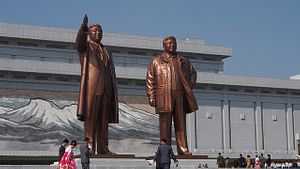How times have changed. It is no small irony in the fact that those South Koreans working hardest to raise attention about the plight of the North Korean people were once pro-North Korea revolutionaries and ardent supporters of Kim Il-sung’s Juche ideology. One such person is Kim Young-hwan, former head of the revolutionary organization (RO) Minhyukdang (People’s Democratic Revolutionary Party), the leftist organization created by Kim Yoing-hwan at the behest of Kim Il-sung and comprised of radical leftists who were active in the 1980s and 1990s. A recent lecture by Kim at Yonsei University (reported on by Daily NK) shows just how much times have changed.
Kim is best known for a secret 1991 trip he took to North Korea (upon invitation), during which he, along with another revolutionary accomplice, met with Kim Il-sung. It was a transformative experience, according to his retelling of the experience. Witnessing real conditions in the country he had admired was what led him to make an about-face. (That he discovered Kim Il-sung himself knew little about Juche ideology might have also played a role.) There are problems with Kim’s narrative, namely that there was a six-year period between his trip to North Korea and him leaving the Minkyukdang, but let us not go that far down the rabbit hole. Kim would, eventually, go on to be a leading activist and co-found the Network for North Korean Democracy and Human Rights (NKNet), an NGO that conducts research about and raises public awareness of conditions in North Korea. Notably, NKNet helped establish Daily NK, an online newspaper that reports on issues and events happening within North Korea. Han Ki-hong, another former pro-North Korea leftist who “converted” in the 1990s, along with Kim and three others (most notably former Donga Ilbo reporter, Sohn Gwang-joo), founded Daily NK.
Although the politics of human rights activism in South Korea is an interesting topic, and one worthy of further attention, one of the more interesting takeaways from Kim Young-hwan’s account of his revolutionary experience are the conditions under which they took place. As is well documented in studies on anti-government protest culture, the Gwangju massacre in May 1980 produced a major social backlash against Chun Doo-hwan’s developmental dictatorship (a backlash against dictatorial rule that was a long time coming).
Notably, the bloody suppression galvanized the student movement and the counter-hegemonic forces within South Korea. Among those not adopting a pro-democratic transition agenda were the more radical groups: the Participatory Democracy (PD) and National Liberation (NL) wings. The former group basically comprised those who favored mass-based class struggle as a way towards national liberation (i.e., Marxists). The latter group, however, saw things differently. Where the PD was took an internationalist class-based conception of things, the NL viewed events through a resolutely nationalist lens. The main problem, as they saw it, was South Korea’s (neo)colonial relationship with the United States and (perceived) indifference the U.S. had towards the plight of Korea’s oppressed (they blamed the U.S. for enabling President Chun’s brutal suppression of the Gwangju Uprising). The solution to Korea’s colonial predicament for the NL? Revolution against the U.S. It should be of little surprise, then, that Kim Il-sung’s Juche ideology (convoluted though it may be) was very appealing. Notions of independence and self-reliance were very attractive to many a young radical.
However, mounting evidence that North Korea was not the socialist heaven it proclaimed itself to be (revealed by an increasing number of North Korean defectors who denounced the evils of the North Korean system on South Korean public television), the experiences people like Kim Young-hwan had while visiting North Korea, and South Korea’s democratic transition led to a significant shift in opinion towards North and South Korea among many former radicals. In a series of letters (some public, some private) penned by Kim, he renounced his former revolutionary ways and called for a new plan of action: promoting change within North Korea. An article at Daily NK contextualizes and translates some of Kim’s writing that marks his political transformation. In an interview with the Chosun Monthly, Kim had the following to say:
My fatal mistake was to spread a pro-North Korea atmosphere in the student activist movement; this was the decisive role I played. But with Hwang Jang Yop’s defection [in February 1997], the Juche idea has been completely split off from the North Korean system. Kim Jong Il’s feudal dynastic regime is the enemy of Juche.
Anyone who can look at the cruel reality of the 20 million North Korean people and still think that there is something else more important; well, that person’s blood and tears are dry — they can’t tell what is up from what is down […] I will devote my one and only life to the overthrow of the Kim Jong Il regime.
Students today, with tests to study for and careers to charter, may not care to work towards the overthrow of the Kim Jong-il regime, but the experiences and conditions that precipitated Kim Young-hwan’s departure with pro-North Korea ideology are worth taking note of if only because they have long passed. Students are not agitating against an authoritarian government; they are not marching in the streets; and they are certainly not joining revolutionary organizations. As a constitutional court mulls over the case on whether to disband the United Progressive Party (UPP), the organization to which Lee Seok-ki (the alleged member of a pro-North Korea RO and senior organizer in Minhyukdang) was a member, and young people display a conservative attitude in their political beliefs, these changes ought to be heeded for they reflect a new South Korea. Times have indeed changed.

































